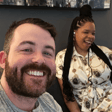Introduction to 'Dirty Money'
00:00:01
Speaker
People will tell you about their wildest hookup before they tell you how much debt they're in. But guess what? Everyone has a money story. And we're here to spill them. Welcome to Dirty Money, a podcast where we talk about the dollars behind the debauchery, the financial glow-ups and fuck-ups, and all the ways money shapes our lives and ways we're told never to talk about.
Host Introductions and Future Topics
00:00:21
Speaker
We're your hosts, Jason. And Bevan? Though this season, Bevan's on a work sabbatical, but don't worry, she'll be back to remind us that money is energy, capitalism is exhausting, and tipping is non-negotiable. Damn right.
Queer and Diverse Money Stories
00:00:36
Speaker
Dirty money is a space for queer, BIPOC, kinky, polyamorous, and sex-positive folks to share their money stories.
00:00:43
Speaker
The good, bad, and the ridiculous. So whether you're making it, spending it, hoarding it, or trying to manifest it let's talk about it.
Introducing Guest Kyle
00:00:53
Speaker
Welcome to Dirty Money.
00:01:01
Speaker
Welcome back and today coming out with Kyle who's a project manager, ex-journalist, and in his own words just a silly goofy guy. He's also a man of many layers but don't worry we're keeping it strictly professional today.
Kyle's Financial Resilience Story
00:01:18
Speaker
Kyle went from being laid off and draining his entire life savings to landing a new job and rebuilding with dignity. We're going to talk about resilience, financial survival, and why talking about money is still somehow more taboo than talking about sex, which is a real shame because Kyle is way more qualified to talk about the latter.
00:01:40
Speaker
Let's get into it. Welcome, Kyle. Hi! This is exciting. Look at us getting dressed up in our breakfast socials today.
Kyle's Personality and Interests
00:01:50
Speaker
It's great. but ah For our listeners who aren't ah watching this episode, I'm Kyle and I are both have donned our, um, our leather attire for today.
00:02:06
Speaker
Our formal wear. Our formal wear, you know, as as we call it. Um, oh, as the dolls call it, the geesh. Yeah. ah Yeah. And i I was joking because I think this is the first time I've ever worn like a harness, but with like clothes on.
00:02:21
Speaker
So if anyone's familiar with that meme of the, uh, I forget his name, but the ah comedian from King of Queens where he's like, he's got his hands in his pockets and he's just kind of like looking up and someone photoshopped like a harness on him. That's how I feel right now. And you look way better than that. Let's just put it that way.
00:02:45
Speaker
Thank you. um so tell you tell the children who you are what you do
Kyle's Professional Life and Mentorship
00:02:53
Speaker
Amazing. um So I'm Kyle, I go by pronouns he, him.
00:02:57
Speaker
um By day, I work as a product manager. um doing education technology and I've been a product manager for but close to six years now.
00:03:09
Speaker
um By night, I like to call myself a troublemaker, but also an enthusiast of just living life the best way that I can. I connect with my leather community. I'm a dancer and choreographer. um i have been in various performances.
00:03:28
Speaker
um I have a background in acting and I just like being the life of the party wherever I go and also providing um support and mentorship to younger folks that are figuring it all out and letting them know that I haven't figured it all out. So it's completely okay.
00:03:49
Speaker
Spoiler alert, no one has it figured out. No one. Anyone that tells you they have it all figured out is lying to themselves. Yep. Stay far away.
Life Advice from Kyle's Mother
00:04:02
Speaker
Red flags all the way. and But yeah, that's that's pretty much what I do in the day. And I think if I want to summarize ah what I do, I'm i'm always curious about I'm always passionate about things that I believe in. And I always try and make the world a better place than when I came in.
00:04:23
Speaker
I always, ah I'm a firm believer in that. And my mom, um you know, when I came out to her, she basically told me, she was like, Kyle, as long as you're a good person and you help people around you, i don't care. And that still sticks to me to this day. So whether I'm in the workroom trying to make education better or I'm you know I'm in the dance room interesting trying to make someone's day better by whipping out a routine think that's what I bring yeah I think we connected ah originally because of go-going yes I think that was how our paths crossed yes you are amazing you are amazing at it let's just put it that was like thank you
00:05:12
Speaker
I was like, oh, I don't have enough ones in my... And then, wait, does everyone know
Innovative Networking with NFC Tags
00:05:18
Speaker
about... Like, you whip out the NFC tag, and you're like, you don't have ones? I got you. Yeah, and so um for those who are don't know what an NFC tag it's basically like a digital business card.
00:05:33
Speaker
made a little... made a little attachment that I have to and whatever outfit I'm wearing. So if people come up to me and they're like, um my gosh, you're amazing. Or you're, you know, you look so good up there. i wish i I didn't bring any ones. I wish to be able to tip you.
00:05:53
Speaker
i just go, yep, you can do that. And I just tap their phone and it brings up my link tree. And it has my Venmo, Cash App, Zelle, all my socials.
00:06:04
Speaker
So, um you know, he's a businessman. The New York girlies don't do it like you do. Let's just put it that way. They need to step up. my So I actually, I got that from a dancer here in Chicago, luck um he had one and I was like, what is that?
00:06:21
Speaker
And then I brought it to DC and then my go-go mom, is in New York and now he has one so we're slowly permeating the business idea to the rest of the go-go world so yeah make go-go great again oh god oh no oh no it's still maggot no nope nope nope mayhem March 7th yes
00:06:55
Speaker
um So I want to dive in a little bit to, um and I definitely want to get your perspective because you're not, you were not born here, correct?
Career Shift from Journalism to Product Management
00:07:08
Speaker
And so English wasn't your first language. It is actually. okay. Yes. oh but but There's my ignorant American-ness happening.
00:07:24
Speaker
um But I do want to, especially with kind of the challenges that you've had over the last year, um i do want to kind of dive a little bit into that and kind of get into that.
00:07:36
Speaker
So you... I mentioned you were in journalism and communications, kind of pivoting before project management. What was the biggest mindset shift that you had to make in that transition?
00:07:54
Speaker
The funny thing is, when I started it out as a journalist, And originally, you know, I'm from Singapore. um I've been in the US for about two years now.
00:08:07
Speaker
And when I started doing journalism in Singapore, um I was talking to folks in business, I was talking to folks, you know, moving, shifting the needle, moving the landscape, whatever you call that, every single day. um And it got me just really curious, ah which was how I started pointing out with a couple of startup ideas um and then.
00:08:37
Speaker
My journalism professor actually looked at me and said, you may have what it takes to become a product manager. And I had no idea what that title was. And like, what? What is this?
00:08:48
Speaker
um And then she said, We all need that one person in every company that's looking at the business, looking at the tech, looking at the the design and looking at the customer's needs and saying, what is going to be the next thing that we are going to do that's going to help improve lives?
00:09:10
Speaker
And that is such a bold, ambitious and slightly nebulous goal. But I think what helped me transition was the fact that I had led my career with curiosity and going back to how I lead my life with curiosity and asking why.
00:09:28
Speaker
Why are we doing this? What what is the impact? what What are we going to what are we going to do And that has the same quality in journalism as it does in product
Journalism and Product Management: A Comparative Insight
00:09:41
Speaker
management. In journalism, you ask folks, why did you do this?
00:09:45
Speaker
why do you do the things that you do? And in product managers, we ask customers, why do you need this particular thing? What is it going to help solve? um And that's going to be the thing that changes everything. So I think, you know, those qualities, the coming in with curiosity, coming in with empathy, helps me make that transition.
00:10:10
Speaker
Yeah. and Was there kind of like a specific moment? um that once you were in it, so I know you said your journalism professor was it said that, you know, you might project management.
00:10:29
Speaker
Was that just like a nice way of them saying that they didn't think you were cut out for journalism? Yeah.
00:10:37
Speaker
I sometimes think that. No, but it was interesting because up until that point, this was like my final year in university, I was giving up for a journalism career.
00:10:49
Speaker
I knew I wanted to be, to do like war journalism. I wanted to go out and, um you know, talk about strife, but I also want to talk about business and how things are moving and how that changes the landscape.
00:11:04
Speaker
um But I think what changed it was my journalism professor did a ah she spun off an innovation class because she was also interested in what was going on in the world of um journalism and tech and how that's changing.
00:11:23
Speaker
um And when I joined that program, you know She sparked this conversation about how I could marry some my startup experiences, my journalism experience um into this role that is at its point, at that point, still about five years in into the industry. So not a lot was known about product management.
Encouragement and Success in Product Management
00:11:47
Speaker
um So it was still a role that needed to be defined. And I got nervous at one point. I was like, I but i call it Jessica. um She doesn't like being called professor. So we call her Jessica. And I said, Jessica, are you sure this is the path for me?
00:12:02
Speaker
And she said, well, you won't know until you try it. And as long as you like what you're doing and you feel that it's it's helping to create impact, go ahead.
00:12:16
Speaker
And then i never looked back, did one internship. yeah And it's been here. and And it it has what brought me here to the US.
00:12:28
Speaker
And once you did make that pivot, was there a specific moment where you thought, yeah this is for me. This is what I'm supposed to be doing.
00:12:40
Speaker
I think I remember the one of the very first um products that I launched, helped launch into the market.
Fulfillment in Product Management
00:12:50
Speaker
um and this was a language learning platform um for korean learners to learn english or you know learn other types of languages and when i launched it and i started getting emails calls from customers saying thank you for doing this this is really helping me i realized that i had
00:13:17
Speaker
the the exact same impact, if not more than what I did when I published an article and had it out in the world and had people telling me, thank you for writing that.
00:13:30
Speaker
And once I realized that payoff was, had an equal weight, but could also be magnified because now so many people are using this thing that i helped to create in the world to improve their lives was like this this is this is it for me this speaks to like who i am as a person i love that um as i uh often joke that um
00:14:03
Speaker
the last five and a half years being a personal finance coach and also coaching i think i had probably about 80 clients when the pandemic hit and like coaching people through a uh global pandemic of just like uncertainty people losing their job um seeing my clients come out on the other side of it.
00:14:31
Speaker
ah Or if i coach someone in and out of bankruptcy, seeing like in real time my effort and my um support and to help them, you know, that's the thing I love about coaching is that I don't actually do anything for my clients. Like I don't, I'm not applying for the loans. I'm not like managing their budget.
00:15:03
Speaker
I help them understand like the power that they have and seeing people succeed. understanding how to play the game.
00:15:15
Speaker
um That's why. um But I joke that now I felt like a therapist. And so making this shift to go back to school to get my a therapy license, ah I thought it was going to be like a career change, but It's literally just been like a career or evolution because everything that I'm learning right now in school, I'm like, oh, I was already doing this.
00:15:47
Speaker
But now I have the vocab. And the evidence-based research behind why these things work. And now I can dive into these things more because I know what they are. Yeah. um So that's been really fulfilling. And I i definitely resonate with um kind of how you feel about...
00:16:10
Speaker
um your current role with seeing your impact um that has on other people. so that's, right that's amazing by the way, that you have, you know, these experiences that you can then build on into that next phase.
00:16:28
Speaker
um And it's, it's, I always say, you know, like career changes can be scary, but when we reframe it into just taking what we already know,
00:16:41
Speaker
and helping like take those intangible skills or tangible skills into that next leg, yeah we are moving forward. we I know.
00:16:52
Speaker
i feel a little guilty, though. like Not actually guilty, but when when i um hear about our program is really small so like getting to know everyone in my classes and things like that you know they're they're students straight out of undergrad they like you know they have no real world experience yet.
Host's Career Transition to Therapy
00:17:16
Speaker
So they're experiencing a different type of ah imposter syndrome, you know, because they're like, i don't have any life experience. And I don't, you know, I going to be able to help people talk through these things um where, you know, I'm coming from a point place where I've helped 500 people talk about their money and have had to sit and help them grieve and help them do these things. And, um, and then there are people that are my age, but came from like,
00:17:53
Speaker
marketing or like, you know, just completely different career paths. So like, I feel like I have a weird advantage.
00:18:04
Speaker
I'm like, cause this stuff, I was like, I'm already, I was already doing this stuff. So like, I feel prepared. I'm not, nothing feels like a completely new concept and I can just continue to hone my ah processes and things that I want to do and how I want to show up.
00:18:27
Speaker
um And not everyone has that ability. um And so that's why i say, i jokingly say like, I feel guilty because it's like, I know for some people, like, this might be very difficult.
00:18:43
Speaker
Yeah. I remember how difficult it was when I started. Like, hold holding space for people. Like...
00:18:53
Speaker
Like, truly, like, if you've never sat down with someone and and held their grief with them, like, it can be uncomfortable.
00:19:05
Speaker
And no amount of over reading about how to do it. is going to prepare you for how you are going to react and how you're going to feel while you're helping them navigate that.
00:19:20
Speaker
um And so, yeah, my experiences that I've had over the last five and a half years ah truly have been um
00:19:31
Speaker
just helped me for this next chapter, which, like I said, I originally thought it was going to be like a shift, but it just feels like I'm building. so
00:19:42
Speaker
ah So powerful. Thank you. So powerful. I'm over here just going, like, just giving my my small little claps. Like, yes! Tell your truth. ah This isn't about me. This is about you. I'm going to shift gears a little bit here.
00:19:58
Speaker
um Before we move on to kind of, like, more about Kyle, I did want to, one last question about your industry and, like, what you do.
00:20:13
Speaker
What's something that working in your field um that people outside the industry may not understand or is a kind of common misconception?
Misconceptions About Product Management
00:20:27
Speaker
It is still a nebulous title, product manager. Because what does that mean? it' What is a product? What are you managing? Are you managing people?
00:20:41
Speaker
ah you managing like an app? like What are you managing? So there's so much misconception about what that term actually is. there's There's another one that's like that. It's um I'm a consultant.
00:20:55
Speaker
What are you consulting? what' What's happening? um You get a lot of that in DC. e yeah Usually means they're lobbyist, but yeah.
00:21:05
Speaker
So yeah, what what's something, so how have you, when when people ask you that, right? I'm sure you get like, what do you do? What does that mean?
00:21:18
Speaker
How do you, what's your, I'm sure you have like your version of like an elevator pitch, right? Yeah. um Even though you're not trying to sell an idea necessarily like a business, but you still need to get all the information that you can get without going into a PowerPoint presentation, right? Right. Without going to a hundred page slide deck as a consultant would. um I'd say, you know,
00:21:47
Speaker
being a product manager is being the orchestrator behind the next few things a company needs to do in order to create ah new product or improve a new offering for its customers um and if i were to think about it product managers are not responsible for the success of the product because it's the engineers that make it it's the designers that design it it's the business is out there exactly it's the marketing people that sell it but if the product fails it's because the product manager failed to define what is going to make this thing successful got it so that's pretty much um
00:22:41
Speaker
you know what we do i would say we're kind of like the one conducting the orchestra and making sure everyone does the thing that they need to do yeah um but without the conductor in the orchestra you know you wouldn't hear the melody that you hear Well, eight that you bring up a good point. So the...
00:23:05
Speaker
Now I'm going to put on my other hat um with my my music degree. um the A lot of times people don't understand that the the conductor or the director of an orchestra or a wind ensemble, while their main focus is...
Role of a Product Manager Compared to Conductor
00:23:26
Speaker
what you see when you go to a concert is them waving their hands. But what you don't know is you're actually, they're the vision behind the interpretation of the piece that the group is playing. so ah That makes a lot of sense to me as so the product manager, you have this vision and you're like, we need to create this version of this thing.
00:23:55
Speaker
This is what I want the company or the orchestra to present. And so you have to work with all the different sections.
00:24:06
Speaker
You have to, so you're very kind of like macro is what you're saying. yeah and i will say while it is a macro role it is also a very micro role because if you go to a department and you say i want to do this they're going to look back at you and go what makes you think this is going to be the best solution so you need your facts you need your data you need to understand the language that they're speaking you need to talk with them and not at them you have to be able to get them to rally with you and i'm the manager of the product i'm not
00:24:43
Speaker
There's no one under me. I'm an individual contributor. And so I cannot influence by top down management. I have to influence without authority.
00:24:56
Speaker
So, you know, it is both this strategic level role, but it's also really directly working yeah with the people that are making it happen. Yeah, absolutely. the You're still the vision holder, but you also need to support the other people.
00:25:17
Speaker
areas so that they understand your vision ah hu because no one's in your head. So yeah pretty much that pretty much that that's it.
Kyle's Depth Beyond a Jovial Persona
00:25:30
Speaker
I do want to shift gears a little bit. You have said before that the best compliment that you've received ah is that you're unquote more than you let on.
00:25:44
Speaker
What do you think people often misjudge or underestimate about you? So this is interesting because um i get this a lot. Like my first impression, um you know, when when people tell me what their first impression of me is like, oh, like you seem very fun, very jovial kind of.
00:26:04
Speaker
very all of that but here you know but once I get to know you further I'm like oh wait you know you actually are thinking a lot about the world you are curious you have your feet dipped in many different places um and so I think it's interesting how you know that that that first impression um that I give kind kind of a way to allow myself to see the world.
00:26:41
Speaker
So I like to present, you know, I like to have fun and be in the moment. um I'm very curious about what people are doing. So I'll get all up in your business on like the first five minutes and like, so what do you do? Like, what you know, but um so, yeah, I think it's it's it's it's it's interesting because um I think once people get to understand know ha why I work in tech, why I ah do dance on the side, um they start to see that there are multiple layers to what I am, but the thread is still the same, right? That I'm still out here trying to bring joy, trying to bring life, and and and trying to good.
00:27:34
Speaker
i am it's I feel like that's part of queer culture. You know, it's the memes when your coworkers ask what you did on the weekend and you're like... Personally, Mary, that's none of your business. Thank you very much. I was like, I don't want to go to a car So yeah I just chilled.
00:27:57
Speaker
I'm having and spending time with friends. yeah Which is what it technically is, right? it's Out and about, you know. yeah In Canada, you're out in a boot.
00:28:08
Speaker
Like, I don't know. i It's just really funny because I'm like, it's such a, I feel like You know, oftentimes when we're ied queer spaces um where we feel like we can truly be ourselves, um but then well we go to other places, um whether it be our job, our regardless of how supportive your family is, like they're still not queer sometimes. So like there's this code switching that happens in kind of, it's just kind of a part of the experience I feel like.
00:28:51
Speaker
Yeah. Yeah. yeah so, yeah, it's just, it's really interesting because it's like the, I'm sure the perception the, like your coworkers of you is very different than the perception of people that you meet like on the weekends when you, when out and doing your things.
Being Authentic at Work
00:29:17
Speaker
And I've tried to marry both of them together, you know, like for example, I, I'm out in the workplace. I don't hide that fact. Um,
00:29:29
Speaker
neither does it have to be a talking point because we're here to get stuff done. You know, like, you know, what I do on the weekends is frankly of no concern to the OKRs of this company.
00:29:39
Speaker
But, you know, but that's not going to stop me from bringing my whole self, because if I don't bring my whole self in the conversation, I'm not able to contribute to the best of my whole self.
00:29:51
Speaker
And that also allows other people to bring their whole selves to the conversation and to the things that they need to get done. Um, but I, so I've been trying to like marry the two together.
00:30:05
Speaker
um but you know, I think what I just find interesting is that, um, queer culture in most places I go, it's always kind of like happy, foo-foo, like jovial, um,
00:30:23
Speaker
But I love getting in one on one conversations with people and really getting to know what makes them tick. Yeah. um And you realize that there's so much like beyond what they present that they let on. So, you know, I I find that aspect fascinating.
00:30:41
Speaker
Yeah. um And what I but what I try to, you know, bring as well. Yeah. I will say it's really powerful that you
00:30:51
Speaker
currently work in a place that you feel safe enough to bring your full self. um I know i've worked in places where just the way that things are being talked about or the conversations that are being brought up, I'm like, they aren't ready for me. All right.
00:31:18
Speaker
we're not We're not going to go... We're not going to talk about any of that. um And that's tough. That can be a really uncomfortable place to be and to work in. And yeah, it breeds this like when people don't feel safe and people don't feel like they can be their full self, they're obviously not going to, well, one, they're not going to loyalty or any sort of like stake in the company and they're not going to necessarily that like sense of belonging is just out the door.
00:31:52
Speaker
um You're getting like a taste of my exit email interview that I gave um my last employer. who um So that is really great that you're um you're at a place that you can be your full self. So that's awesome.
00:32:13
Speaker
Thank you. I mean, it's partially like thinking back about it. I've also kind of in my life, I've I've been trying to choose and be very intentional about choosing places where I can do that. And I recognize my privilege in being able to do that because some people do not have that luxury at all.
00:32:33
Speaker
um But wherever I go, I always make it a point to to show my whole self wherever possible. And hopefully that helps someone else go, you know what?
00:32:48
Speaker
You know if Kyle can be a little silly and goofy, but still get the job done, maybe maybe I can be the same as well. So, yeah. And that was um just for clarification for everyone at home.
00:33:01
Speaker
um When Kyle said whole self, that's with a w So. Oh, jump.
00:33:08
Speaker
What? Anyway. not available on iTunes. Is iTunes sort of thing?
00:33:14
Speaker
ah Now streaming on SoundCloud. um We love SoundCloud. We love the bootleg versions. I love the bootleg. Every time there's a bootleg version of Abracadabra that releases, I'm like, mama. So...
00:33:27
Speaker
mama um so How have you kind of like balanced being this like approachable and fun and curious um with also being taken seriously?
Balancing Fun and Seriousness
00:33:44
Speaker
um Because I feel like sometimes if people are labeled like, oh, he's, you know, we know Kyle, he's fun, he's silly. um Sometimes the being taken seriously is not, at least initially, not something that people equate that with. So how do you how do you balance that?
00:34:05
Speaker
Yeah, it's interesting because I pretty much let people come to their own conclusions you know i don't i don't try and force myself to to say okay now you know here's why should be taken seriously because i have this other thing and that other thing and that other thing and i always say the people that really want to get to know you better the people that see value in the conversation will want to dig further. And those are the people that you want with you in your life.
00:34:43
Speaker
And those are the people are going to help, you know, get you to places because they are interested in knowing more. So instead of putting all of that up front, you know, I don't you know, i don't hide as many things that that are going on in in in my life.
00:35:02
Speaker
i always try and be upfront as possible. If someone asks, I will talk about it. If someone asks, what do you do? I'm going to talk about it. If someone asks, what do you do for fun? I'm going to talk about it. um And I always just try, you know, obviously knowing um the space and what why what I can share at that given time, but always making sure that I can you know try my best to to to be as close to my whole self when asked.
00:35:32
Speaker
Yeah, I I'm laughing because I um I wear this pendant all the time. And for those that can't see it, it's my little paw print.
00:35:45
Speaker
And if I'm in a professional setting and someone asks about it, it's also just convenient that I've fostered a lot of dogs. I love dogs.
00:35:58
Speaker
And that's all they need to know. So...
00:36:04
Speaker
They're like, that's so cute. I'm like, I know. um Tell me about it. Tell me about it, Susan. and Tell me more. I could never foster. I would just adopt all of them.
00:36:18
Speaker
and know. You know, sometimes there are things people don't need to know beyond beyond beyond a certain thing, right? I always say, like, you know, if you're curious about something, do you consent to knowing more?
00:36:32
Speaker
yeah like I always put that disclaimer out there because you know because once you consent, I'm going to tell you. so Anyhow.
Overcoming Job Loss with Support
00:36:41
Speaker
um So i I mentioned it at the beginning of the episode, um but going back to last January, were laid off yeah um and you didn't land a new job until August.
00:37:02
Speaker
Someone who went through a similar journey the previous year, um i have a lot of feelings about it, but I would love to know kind of what was the hardest part of that journey for you?
00:37:14
Speaker
Yeah. um Honestly, the hardest part was feeling like I failed. um And that really is the, the battle is between you and yourself.
00:37:28
Speaker
um At least it's sort of in my experience. um when i got retrenched um in january due to a company restructuring um you know i thought i was still gonna be okay i didn't i was not prepared for how intense the job search was going to be um you know in somewhere around like June, July, um i made the decision to go back to Singapore.
00:37:59
Speaker
yeah And I remember that day when I came back after a 16-hour flight, landed at my sister's place because I needed to stay and I needed to move in with her while I thought everything out.
00:38:14
Speaker
I remember dropping my bags 8 a.m. and I was in tears. I completely felt like I failed. I had wiped out all of my life savings. um I truly, truly felt like ground zero.
00:38:31
Speaker
And my sister was the person that you know reminded me that you haven't failed. You're just starting anew. you just have You just have all this experience and now you're moving on to the next thing.
00:38:46
Speaker
yeah um and that really was... one of the things that kept me going despite all those things, know, battling that perception with myself, but relying on the support of the people around me um to tell me to get off my own head um and to move forward.
00:39:09
Speaker
Well, And I feel like we are conditioned, um at least here in the U.S., so I would love to get your perspective as well um from your culture back home as well with this idea of, you know, capitalism makes me makes us feel guilty if we're not producing, if we're not working, if we're not contributing to the vehicle that is the ah exploitive capitalist society.
00:39:48
Speaker
And so when you're not in that, this feeling of like, I'm not doing anything, so I must be lazy, or I'm...
00:40:01
Speaker
um And also, like, and another thing that we don't talk about a lot is, especially if you're laid off, you didn't choose to leave your company, that's a form of grief.
00:40:14
Speaker
Because if you weren't expecting it, if you were enjoying what you were doing, that's a huge change to your daily kind of, like, flow.
00:40:28
Speaker
And it is a type of grief that... And we're often just told, just you got to start finding a new job and you got to like, and we don't always have the time and the space and the true support to really grieve that.
00:40:47
Speaker
ah And I don't think that's talked about enough.
Grieving Job Loss
00:40:51
Speaker
um Because that's what happened to me with with um when I got laid off in February of 23.
00:41:00
Speaker
ah It was completely out of the blue. at And i was fortunate enough at the time that my husband and I had enough savings that I could take the time to grieve, explore, figure out the next steps.
00:41:22
Speaker
But then I had to rebuild, you know, I get to a certain point, but you know, it It the way society here in the US, it makes it really hard to kind of grieve job loss correctly or help yeah in a healthy way, I should say. There's not one correct way to do things. Yeah.
00:41:46
Speaker
is Is the culture back home similar? Or how does, what, ah do you know kind of of any ah differences with that? um Yeah. you I think it was interesting because when I was in the U.S. um grieving over this job loss,
00:42:12
Speaker
it was actually pretty similar in the fact that I was lucky enough to be surrounded by friends and the leather community and the queer community that embraced me, grieved with me, and were with me almost every step of the way, trying to get me in referrals into their companies and like helping out, but also you know sitting with me in that grief.
00:42:48
Speaker
you know like very ah very cathartic experience. um When I got back to Singapore, I think what was interesting is we have at at least what I experienced was a mentality in which how can we quickly get you back up on your feet um and get and get things to start working and um and I'm painting Singapore in broad brushstrokes here, so I'm just
Cultural Differences in Coping with Job Loss
00:43:17
Speaker
going to caveat this. Your lived experience.
00:43:18
Speaker
yeah Yeah, this is my lived experience, because, you know, um this is what this is what I've experienced. it may not be what the culture of Singapore is, but at least in my own spaces, I had friends that um quickly connected me jobs and side opportunities. There was and not a lot of kind of sitting around and grieving and talking about it. There is this culture of like, let's get up and go.
00:43:45
Speaker
let's Let's move. Which is a culture that I'm very much used to. um um So in some ways, it was a little bit harder to process the grief back in Singapore.
00:44:01
Speaker
But by I know I always kind of made it a point. One of my but am i very close ah friends here in the US, one of my very close queer friends here told me that sometimes it's completely okay for you to just sit and and deal with the emotions they're going through. Know that it will pass, but give yourself that space and that time to deal with it.
00:44:31
Speaker
uh because it is a lot and you and these feelings don't just come at one go and leave they come in waves they come when you least expect it you know they come when you're in when you're in the bathroom and you're like why is everything the way it is you know it comes in it comes in then and ah to allow yourself those those moments brought and i brought bit of that yeah we're also like i ah stupidly like taught that like if you just if you if if you just sit with them and you deal with them then you'll overcome them but it's like it's not linear like any type of loss is going to ah affect you
00:45:18
Speaker
in ways that you don't quite understand.
Understanding Grief's Non-linear Nature
00:45:22
Speaker
I think of it like, so you've ever been at like a lake and it's like really um still and like serene and you drop like a pebble,
00:45:37
Speaker
it starts creating these ripples. But ah then if you drop like a bigger rock a little bit further away or closer, and it creates all these ripples that happen and move independently, but then like attached to each other. And like, that's kind of what grief is like, where it's like you're,
00:45:58
Speaker
you're You're the pond, right? And these are always going to kind of happen. And you're gonna you're going to have high points and low points. And sometimes your griefs intersect.
00:46:11
Speaker
We don't just, you know, the the joke about the...
00:46:17
Speaker
tell God I'm not his strongest, uh, uh, soldier. I w I don't want his, you know, hardest battles anymore. You know, mean we don't just deal with things linear, linearly, um you know, life happens. And so this idea of like, you just kind of have to,
00:46:38
Speaker
a ebb and flow and and um but that's how i kind of view grief and and it's not just this like okay i'm gonna sit here i'm gonna feel my feelings okay i've felt them i'm good yeah and the whole thing about like yes it does get better once you go past it but that doesn't mean the grief stops till today i'm still processing the grief Absolutely. know And these are things that you just you have to contend with as you move into something.
00:47:14
Speaker
So just because someone's on that next phase and looks like they're succeeding doesn't mean that the grief is gone. And I think that's ah that's a very important thing um to to to think about.
00:47:34
Speaker
and I just, I resonate so much with your comment about like the job search while you were here in the U S.
00:47:49
Speaker
Honestly, that was one of the reasons that pushed me into going to grad school. I hated my job so much. It was such ah and I don't like using this word, but it was such a toxic place to work and loved my clients, loved of the work that I did, hated my employer.
00:48:13
Speaker
And like honestly, I've had a lot of jobs in my life. This was by far the worst place I've ever worked. And For months, I was applying for jobs. I was trying to, how can I pivot my experience and education into a different role that I would be happy in?
00:48:40
Speaker
And nothing. i think i I think I maybe had, over the course of six months, maybe one or two phone interviews. And that made me realize, I'm like, what else can I do?
00:48:56
Speaker
How can i this isn't working. I need to take control of the things that I can take control of. And I'm fortunate enough that I sold my body to the government.
00:49:10
Speaker
And so i did some calculations and realized if I go back to school, the government will pay me every month more than what I'm currently bringing home from this awful job.
00:49:24
Speaker
Wow. So I was like, okay, so this is a viable path for me. And, um you know, I don't regret where I worked.
00:49:36
Speaker
That year and a half taught me so much. um Really helped me fine-tune information. what i wanted to do and and how i want to show up and how i want to navigate you know um the next chapter of of my career but you know so i can't even imagine what it felt like because i mean i i understand like i depleted




















